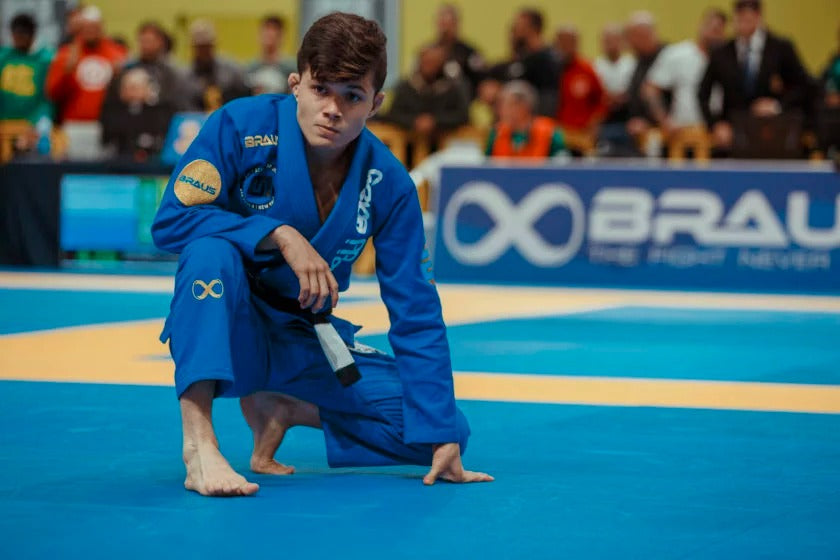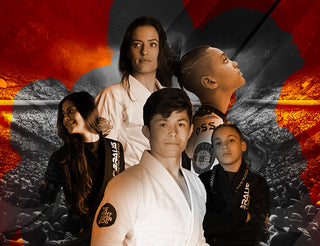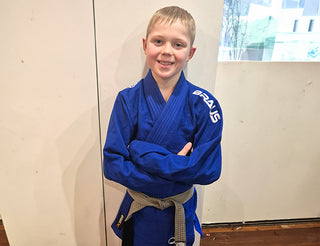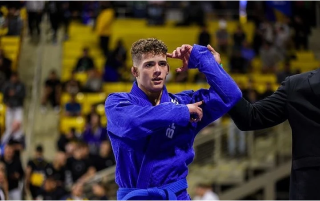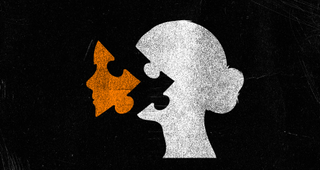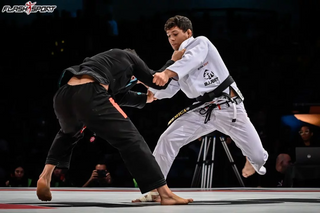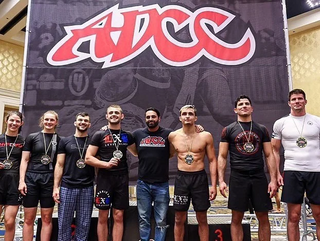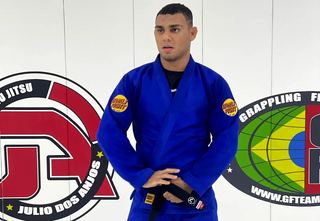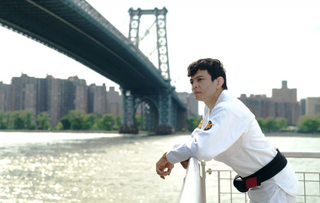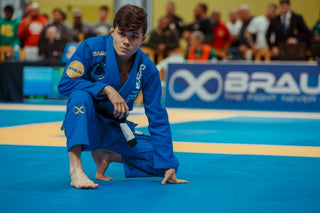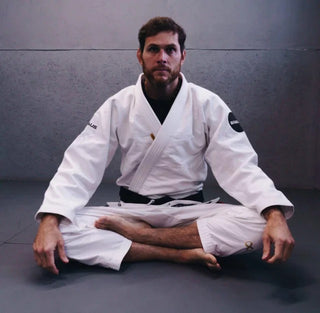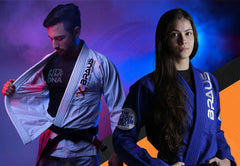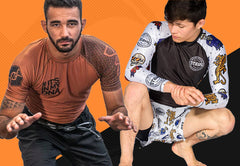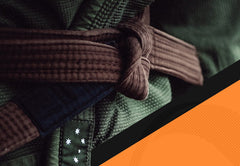“I used to live in a one-room house with my mother and two sisters, beside an ‘Igarapé’”, explains Thalison Soares, recalling the beginnings of his life before investing in a professional career in Jiu-Jitsu. The Brazilian dictionary explains that an “igarapé” is a narrow body of water between two landmasses, almost a waterway that only holds canoes and small boats. “When it rained, the water rose until it reached the bottom of the house, so we couldn’t go out. Nowadays I have a much better life.”
Thalison Soares now teaches at an academy in Byron Bay, one of Australia’s wealthiest and most influential cities. Investing so early in a large gym is not the usual behavior of most top athletes. Despite having been a prominent color belt and very successful in tournaments, with berimbolo and spectacular spins that made him a dangerous opponent underneath, Thalison decided to settle in Australia right after his campaign at the European 2020 as a black belt. His goal was to seek his path through the gentle art not only as a competitor but as an entrepreneur and gym owner.
“I knew that competing wasn’t everything”, said Thalison, in an interview given to our friends at Graciemag. “I was lucky to follow and befriend several world champions, so I could see that, despite being at a high competitive level, that was not what they were aiming for. Why would that be my dream if not even those who were in that place were completely satisfied?”
Check out the complete interview below:
How did you get started in Jiu-Jitsu?
THALISON SOARES: I used to live in Caviana, in the interior of Amazonas, but I went to live with my mother in Manaus when I was 11 years old, due to the death of my father. Back in Manaus, I had some friends who lived near my house and who were already training Jiu-Jitsu through a social project. They always called me to train with them, but I was still mourning my dad and always postponed my visit. Eventually, I mustered my courage and decided to go, a choice that ended up helping me a lot. Jiu-Jitsu is one of the best sports to connect your body and mind, so I, who was psychologically shaken at the time, found the ideal help to strengthen my mind and overcome that sadness.
What was the circumstance that led you to join Cicero Costha’s academy?
In Manaus, I already had contact with professor Melqui Galvão. I trained with him and Mica at times and had already mentioned my wish to make a living from the sport. I was reaching the age where I would have to choose between working or training. At the time, Melqui was affiliated with Cícero and had his contact information, so he made me an offer to go train there. I contacted Cícero and went to São Paulo to start my career.
Competitors usually open an academy after a big title, like becoming a World Champion. You opened it before and now you’ve set your sights on this achievement. What led you to this approach?
Competitors want to be world champions. They think they’re going to be millionaires with sponsorship and when they reach the end of their careers, they notice that they didn’t make that much money and end up opening an academy. You don’t need to be a world champion to start a business, but you do need to learn how to run a business. Being a champion and good at fighting doesn’t mean you’ll be a good teacher. Being world champion matters for those who follow competitions, but for the students, it doesn’t matter who I am. What makes a difference for the students is the location, the class, how the gym works, whether the family feels safe, and whether he feels good in training. That’s what matters to a parent who is bringing a child or an elderly person who wants to start something new in life. I knew that competing wasn’t everything. I was lucky to follow and befriend several world champions, so I could see that, despite being at a high competitive level, that was not what they were aiming for. Why would that be my dream if not even those who were in that place were completely satisfied?
As an athlete reaching his peak, do you think investing in a teaching career will affect your competitive pace?
Being a teacher was the best thing that ever happened to me. I’ve always had a very good understanding of Jiu-Jitsu and, unlike most people, I like Jiu-Jitsu in all aspects. Many people have preferences within the sport, like passing, guarding, or any other style, but I want to do all of that. When you have a student, you start to see Jiu-Jitsu differently, you see it through their eyes. The result of this is that you end up understanding the art better and evolving within it. Today, my understanding of Jiu-Jitsu, and what it takes to be good, is huge. When you reach this perception, you can observe a high-level athlete and even surpass him.
How has the pandemic scenario affected your performance as a competitor?
Before the pandemic, I competed fifteen times a year, that is, more than once a month. At this pace of competition, you need to be well trained, healthy and you need to always pay attention to your weight. This set of factors ends up leaving you with no time to train Jiu-Jitsu in-depth, you only seek to improve what you already know, what you do well.
With the pandemic and the hiatus in competition, I stopped training my strengths and started working on my weaknesses. My Jiu-Jitsu leaped in that period because I started to focus on the things I wasn’t good at, making them complement my game. I can say that I was able to evolve in this way because I’m not competing and also because I’m a teacher, which leads me to learn from my students.
You chose Australia to be the home of your first gym. What were the criteria used for this choice?
I didn’t choose Australia, it chose me (laughs). It’s a very good place, reminds me a lot of Brazil. I believe that in ten years, Australia will be on the same level as the United States in terms of the evolution of Jiu-Jitsu, of people migrating in search of opportunities. Unlike the United States, Australia invests a lot in Jiu-Jitsu and you feel welcome here. Not to mention other factors, such as the climate, which is very similar to that of Brazil, or the hospitals, which offer free services that are very expensive in the USA.
And how did you “discover” Australia and its potential for the Jiu-Jitsu market?
On my first visit, I was invited to train here. I had just won the World championship as a
purple belt and had injured my knee. I remember struggling to be able to walk. At that time, I had a different mentality, I thought I couldn’t spend a lot of time in other places because I would miss training. I planned to come to Australia and spend two months recovering my knee, but I ended up falling in love with the place. I came back here a few times after that until I decided to stay for good just before the pandemic.
When you decided to stay in Australia, was there already any proposal to teach? How did you deal with the local language barrier?
I had a partner here and was already planning to open a gym with him. He trains Jiu-Jitsu, is a purple belt but doesn’t crave competition, it’s more of a hobby to him. I already had a girlfriend, so I decided to stay here (laughs). About the language, I only learned to speak English when I moved here permanently, in 2020. When I was training in the United States, at Unity, I had more contact with other Brazilians. It was different here, everyone was Australian, so I had to learn how to communicate. My English isn’t perfect yet, but it’s much better than before.
How did your entrepreneurial side develop?
My parents got divorced when I was little and I went to live with my father in Amazonas. He had a fruit stand and I always worked there, so I started to have a basic notion of financial management very early on. Today, I am very good with accounts and always calculate mentally the expenses and profits made. My main objective is not to be a world champion, but to undertake and make Jiu-Jitsu grow and evolve. I want everyone who makes a living from Jiu-Jitsu to be paid well for what they do, whether they are athletes, teachers, or any other role in the sport.
This entrepreneurial side even helps me compete, as I no longer rely solely on financial support to participate in a tournament. Winning a championship will help and earn you more money, but it’s no longer essential for me to stay active in Jiu-Jitsu. If I become a world champion, everyone will be happy for me, but it will make little difference to my students, the ones who make the biggest contribution to my income.
Thalison became a businessman and a teacher, but what about the return to competition? Were you eager to go back to the competitive mats?
Yes, I wanted to see how I would perform. I believe I’m much better off than before and feel that my Jiu-Jitsu had the equivalent of ten years of evolution during this pandemic period. I even had a superfight during the pandemic and did very well. Jiu-Jitsu is still maturing at some points, and competition is one of those points. In the past, you just needed to win, regardless of how you did it. Nowadays everyone wants to see a good fight, the only one who cares if you won or lost is your teacher. Fans want to see a good battle and that’s how we encourage the public to invest in Jiu-Jitsu.
Analyzing your trajectory, what is the tip you leave for practitioners and athletes seeking success in Jiu-Jitsu?
It’s important to train and compete, but you need other skills to make a living from the sport. Taking part in tournaments and being a champion is good and builds up your image, but it’s not enough to be successful in Jiu-Jitsu. I know people who are world champions and don’t have a house or a car, and end up living on rent or even with other people. If I was alone, maybe I wouldn’t have a problem living like this, but I have a family. When I decided to move to Australia and become a teacher, I received a lot of criticism from people who believed that my focus should be on competition. Because of my different point of view, I was able to buy a new house for my mother last year.
Being a champion, even if it’s at a World tournament, won’t make you sell well. What matters is to offer quality service so that you can generate a stable income and live well within the sport. It’s important to nurture this mentality so that Jiu-Jitsu can grow and offer even more opportunities for its practitioners.

